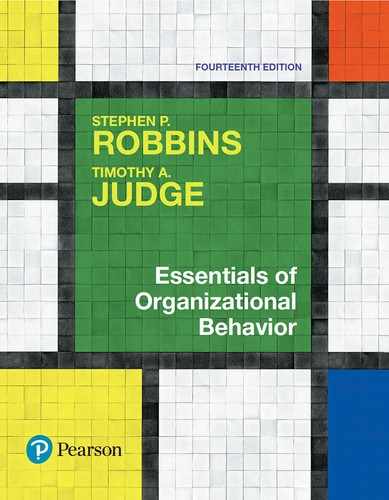What Causes Job Satisfaction?
Think about the best job you’ve ever had. What made it the best? The reasons can differ greatly. Let’s consider some characteristics that likely influence job satisfaction, starting with job conditions.
Job Conditions
![]() Generally, interesting jobs that provide training, variety, independence, and control satisfy most employees. Interdependence, feedback, social support, and interaction with coworkers outside the workplace are also strongly related to job satisfaction, even after accounting for characteristics of the work itself.26 As you may have guessed, managers also play a big role in employees’ job satisfaction. Employees who feel empowered by their leaders experience higher job satisfaction, according to one study of a large Hong Kong telecommunications corporation.27 Research in Israel further suggested that a manager’s attentiveness, responsiveness, and support increase the employee’s job satisfaction.28
Generally, interesting jobs that provide training, variety, independence, and control satisfy most employees. Interdependence, feedback, social support, and interaction with coworkers outside the workplace are also strongly related to job satisfaction, even after accounting for characteristics of the work itself.26 As you may have guessed, managers also play a big role in employees’ job satisfaction. Employees who feel empowered by their leaders experience higher job satisfaction, according to one study of a large Hong Kong telecommunications corporation.27 Research in Israel further suggested that a manager’s attentiveness, responsiveness, and support increase the employee’s job satisfaction.28
Thus, job conditions—especially the intrinsic nature of the work itself, social interactions, and supervision—are important predictors of job satisfaction. Although each is important, and although their relative value will vary across employees, the intrinsic nature of the work is most important.29 In other words, you have to like what you do.
Personality
As important as job conditions are to job satisfaction, personality also plays an important role. People who have positive core self-evaluations (CSEs; see Chapter 5 for further discussion)—who believe in their inner worth and basic competence—are more satisfied with their jobs than people with negative CSEs. Additionally, in the context of commitment to one’s career, CSE influences job satisfaction. People with high levels of both CSE and career commitment may realize particularly high job satisfaction.30
Pay
You’ve probably noticed that pay comes up often when people discuss job satisfaction. Pay does correlate with job satisfaction and overall happiness for many people, but the effect can be smaller once an individual reaches a standard level of comfortable living. As a corollary, money does motivate people, as we discover in Chapter 8. But what motivates us is not necessarily the same as what makes us happy.
Corporate Social Responsibility (CSR)
Would you be as happy to work for an organization with a stated social welfare mission as you would for an organization without one? An organization’s commitment to corporate social responsibility (CSR), or its self-regulated actions to benefit society or the environment beyond what is required by law, increasingly affects employee job satisfaction. Organizations practice CSR through environmental sustainability initiatives, nonprofit work, charitable giving, and other globally attuned philanthropy.
CSR is good for the planet and good for people. Employees whose personal values fit with the organization’s CSR mission are often more satisfied. In fact, of 59 large and small organizations recently surveyed, 86 percent reported they have happier employees as a result of their CSR programs.31
The relationship between CSR and job satisfaction is particularly strong for millennials. “The next generation of employees is seeking out employers that are focused on the triple bottom line: people, planet, and revenue,” said Susan Cooney, founder of philanthropy firm Givelocity.32 CSR allows workers to serve a higher purpose or contribute to a mission. According to researcher Amy Wrzesniewski, people who view their work as part of a higher purpose often realize higher job satisfaction.33 However, an organization’s CSR efforts must be well governed and its initiatives must be sustainable for long-term job satisfaction benefits.34
Although the link between CSR and job satisfaction is strengthening, not all employees find value in CSR.35 However, when managed well it can also significantly contribute to increased employee job satisfaction. Therefore, organizations need to address a few issues in order to be most effective. First, not all projects are equally meaningful for every person’s job satisfaction, yet participation for all employees is sometimes expected. Second, some organizations require employees to contribute in a prescribed manner. Pressuring people to go “above and beyond” in ways that are not natural for them can burn them out for future CSR projects36 and lower their job satisfaction, particularly when CSR projects provide direct benefits to the organization (such as positive press coverage).37 People want CSR to be genuine and authentic.
Lastly, CSR measures can seem disconnected from the employee’s actual work,38 providing no increase to job satisfaction. In sum, CSR is a needed, positive trend of accountability and serving.
